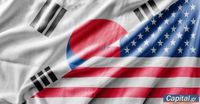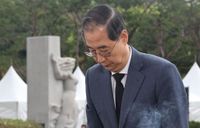South Korea is set to embark on pivotal trade negotiations with the United States this week, as announced by the Ministry of Trade in Seoul. The talks, scheduled to take place in Washington, come in response to a proposal from the U.S. and are anticipated to address the contentious tariffs imposed on South Korean goods by the previous Trump administration.
South Korea's Finance Minister Choi Sang-mok and Trade Minister Ahn Duk-geun will meet with U.S. Trade Representative Jamison Greer and Treasury Secretary Scott Bessen during the spring meetings of the International Monetary Fund and the World Bank. This high-level dialogue aims to ease the 25% tariffs that were announced by former President Donald Trump, which South Korea hopes to lower before these tariffs come into full effect.
"We are approaching these upcoming trade discussions with a spirit of cooperation and not retaliation," said South Korean Trade Minister Han Duk-soo in an interview with the Financial Times. His comments reflect a commitment to maintaining and strengthening the long-standing alliance between the U.S. and South Korea, especially as new tariffs and ongoing global trade tensions threaten this relationship.
Han, who recently took over as Prime Minister following the impeachment of President Yoon Suk-yeol, emphasized the historical ties that bind the two nations. He noted, "The role of the United States is crucial for Korea. After the devastation of the Korean War, the U.S. provided assistance, technology transfer, investments, and security assurances, which helped South Korea become a comfortable investment environment for foreigners."
In recent years, the U.S. has surpassed China to become South Korea's largest export market, with a record trade surplus of $55 billion in 2024, significantly higher than in previous years. However, the tariffs target key sectors of the South Korean economy, including the automotive industry, which has seen giants like Hyundai and Kia impacted by the additional 25% duties aimed at foreign automakers.
Meanwhile, the South Korean Customs Agency has been grappling with rising complaints from importers and citizens regarding the valuation of vehicles imported from South Korea. A new internal directive mandates that these vehicles be assessed based on their market value in South Korea, rather than inflated estimates that have led to increased customs duties.
The Customs Agency's decision comes after numerous grievances about overpricing, which has been attributed to incorrect applications of the Customs Code. "This directive allows for valuation methods to be used that align with the actual market conditions in Korea, thereby ensuring fairer pricing for imported vehicles," the agency stated.
According to legal experts, the agency has faced criticism for not properly implementing the provisions of the Customs Code, leading to inflated customs duties that unfairly burden consumers. Lawyer Dren Kukaj pointed out that many of the assessments for Korean vehicles were based on European Union price lists, which do not accurately reflect the actual transaction values in Korea.
"They overestimate these vehicles, increasing the financial burden on consumers, which I believe is an illegal practice and unfair to our citizens who have found cheaper vehicles," Kukaj remarked. He highlighted that in many cases, the valuation of Korean cars was set higher than their actual worth, directly impacting the customs fees consumers had to pay.
In 2024, the Customs Agency reported that five vehicles from South Korea, valued at approximately €102,069, were imported, generating over €6 million in customs duties. The agency has received 31 complaints regarding value adjustments, with about 48% of these being approved.
As South Korea prepares for these significant trade discussions, the implications of the tariffs and the customs valuation issues are at the forefront of the dialogue. Han has stated that the government is open to finding mutually beneficial solutions, including increasing purchases of American liquefied natural gas and commercial aircraft to address the trade imbalance.
The upcoming meetings in Washington are viewed as a critical juncture for U.S.-South Korea relations, as both nations seek to navigate the complexities of trade while maintaining their historical alliance. The outcome of these discussions could have lasting effects on the economic landscape of both countries.
In summary, South Korea is not only addressing immediate trade concerns but is also reaffirming its commitment to a collaborative relationship with the United States. The stakes are high as both nations work to ensure that their partnership remains strong amid evolving global economic challenges.






